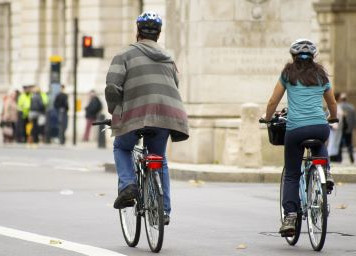
Becca Massey-Chase, co-deputy head of IPPR’s Environmental Justice Commission.
The transport sector is the number one contributor to the UK’s greenhouse gas emissions, with cars causing the lion’s share of surface transport emissions. The money and energy going into tackling the urgency of decarbonisation creates a once in a generation opportunity to shift our transport system away from the status quo.
The UK government’s recent transport decarbonisation plan includes some proposals that signal the possibility of a fairer, as well as greener, future. However, as others have said, it is also struggling with an identity crisis, torn between making bold statements on active travel and public transport, and still wanting to reassure the public that they can carry on driving as they are now.
Fairness has to be a priority
Decarbonising transport is non-negotiable, but there are choices in how we do it. Reducing emissions can and should go hand in hand with increasing fairness, but it won’t unless that is the priority. This is the core message of the final report of the Environmental Justice Commission.
Its impact on the climate crisis is only one reason why our transport system is not fit for purpose. It is also damaging our natural world, perpetuates health inequalities, disadvantages people who already face challenges in accessing opportunities, and poses threats to people’s safety.
If you are on a low income, you are less likely to own a car but more likely to suffer the consequences of others driving them. White people are far more likely to have access to a car than all other ethnicities; black people are over twice as likely to have no access to a car. A child living in a poorer area in Scotland is three times more likely to be injured by road traffic than one living in a richer area. A person of colour is more likely to live in neighbourhoods with poor air quality. These are the realities created by our current transport system.
So, what changes would make our transport system fairer? More investment in walking and cycling, making it easier and more enjoyable for a wider range of people to make short journeys in an active sustainable way. More investment in public transport, especially buses. Significantly less investment in roads, and particularly in road expansion. More powers, long term funding and support given to local authorities and community groups, would help to drive changes that work for, and have the buy-in of, the local community.
100 places in the world offer free public transport
Transport investment decisions should not be so centred on commuter journeys and, instead, reflect the importance of shorter local trips, to the shops and for childcare, as well as work. These are not unusual or radical suggestions. More than 100 towns and cities in the world have free, local public transport. If we really want to see a huge uplift in fairness in our transport system, the UK should follow their lead.
On their own, better and affordable public transport services won’t be enough to deliver the scale of shift away from cars we need. For that, we need policies that reflect the true cost of driving too. Investment in local public transport exemplifies what putting fairness at the heart of decarbonisation could look like, in the immediate benefits it brings to those who can’t afford to run a car.
Involving people in the decisions that affect them is vital to increasing fairness. This was one of the core messages from the communities we spoke to through the Environmental Justice Commission. The deliberations and recommendations that came from four citizens’ juries, across very different parts of the UK, painted a picture of what a good life in the 21st century should look and feel like. And it’s one designed with everyone’s needs in mind.
People want few vehicles on the road
The UK absolutely needs to electrify its vehicle fleet, and urgently. But those we spoke to also want fewer vehicles driving around and parked on our streets. The average car is parked for 96 per cent of the time. Just reducing how much we use them – leaving them parked up even more of the time – wastes space and resources. Our juries told us that having access to an electric car, when you need one, was essential, but that access didn’t have to mean ownership.
The UK government currently forecasts up to a 51 per cent increase in traffic in England and Wales by 2050, by which time there’s expected to be up to ten million more cars on the road, taking the total to over 40 million. This is not compatible with rapid progress on decarbonisation or increasing health outcomes.
We are at a crucial juncture in transport policy. If we overemphasise the shift to electric, at the expense of efforts to reduce car trips, then we risk locking in car dependency for generations. And, as we heard from citizens across the UK, that’s not the future the public wants.





